Giniling na Baboy wasn't just another ulam, it was my ultimate baon throughout elementary school. I can still remember how my classmates would peek into my lunchbox, drawn by the mouthwatering aroma of this hearty Pinoy ground pork stew.
My Mama would always pack it with an extra cup of rice because she knew I'd mix every grain with that savory-sweet sauce, making sure no drop went to waste. The tender pork, perfectly cooked potatoes, and sweet carrots made this dish my childhood favorite. And now, as a busy mom myself, I understand why it was my mother's go-to recipe: it's quick, affordable and absolutely delicious.
Once you try this Giniling na Baboy recipe, passed down through generations in our family kitchen, you'll understand why this humble dish has been a faithful companion in countless Filipino baon containers and family dinners.
Jump to:
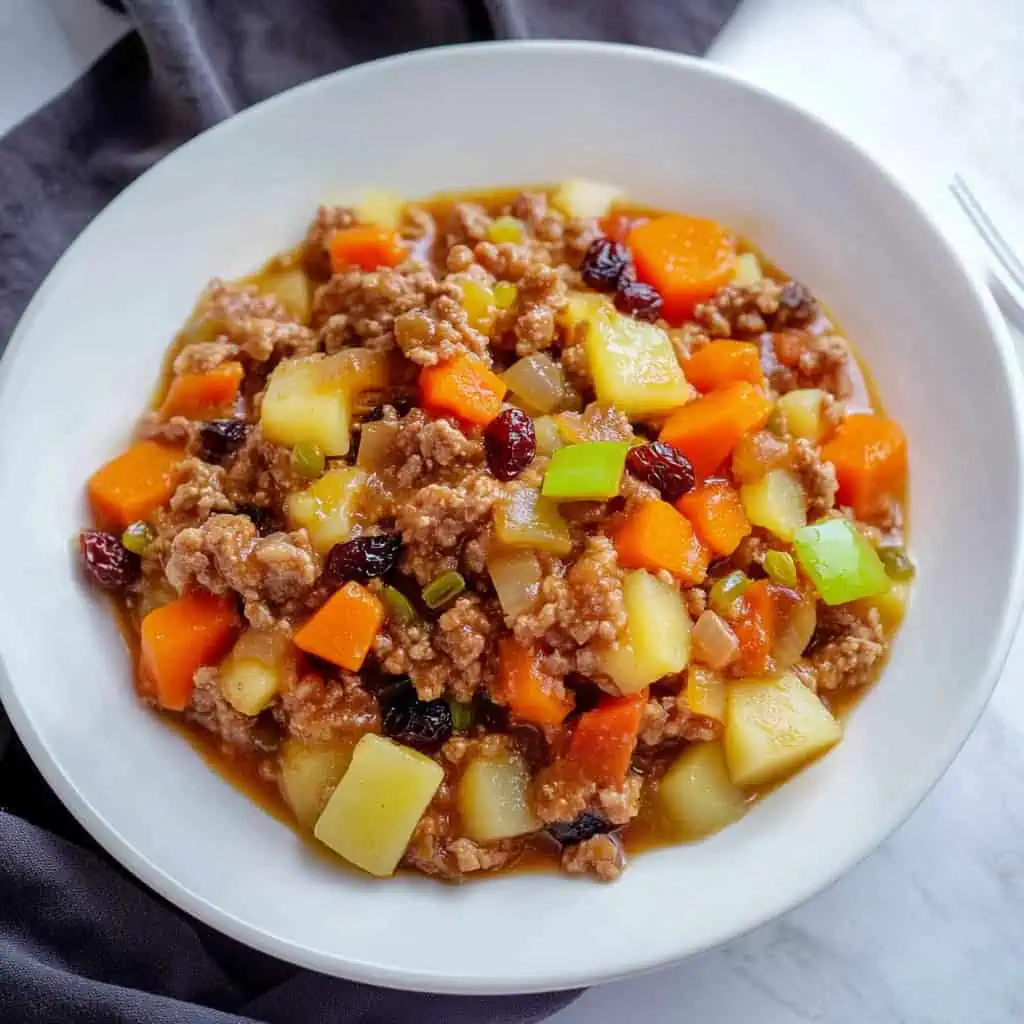
Why You'll Love This Recipe
- Simple Ingredients: Uses everyday ingredients you can find at any grocery store
- Budget-Friendly: Perfect for feeding a family without breaking the bank
- Versatile: Works great as a main dish, sandwich filling, or breakfast meal
- Make-Ahead Friendly: Tastes even better the next day
- Beginner-Friendly: Easy enough for novice cooks but delicious enough for experts
Ingredients
This Giniling na Baboy recipe combines ingredients that create perfect balance and authentic Filipino flavor. Ground pork provides a tender, juicy base while potatoes and carrots add hearty substance and natural sweetness.
Tomatoes and garlic create a savory foundation, and fish sauce (patis) delivers that distinctive Filipino umami depth. The bell peppers add fresh crunch and vibrant color, while raisins introduce subtle sweetness that counterbalances the savory elements, a signature Filipino cooking technique.
Together, these accessible ingredients create a comforting dish that's economical, nutritious, and showcases the sweet-savory harmony that makes Filipino cuisine so beloved.
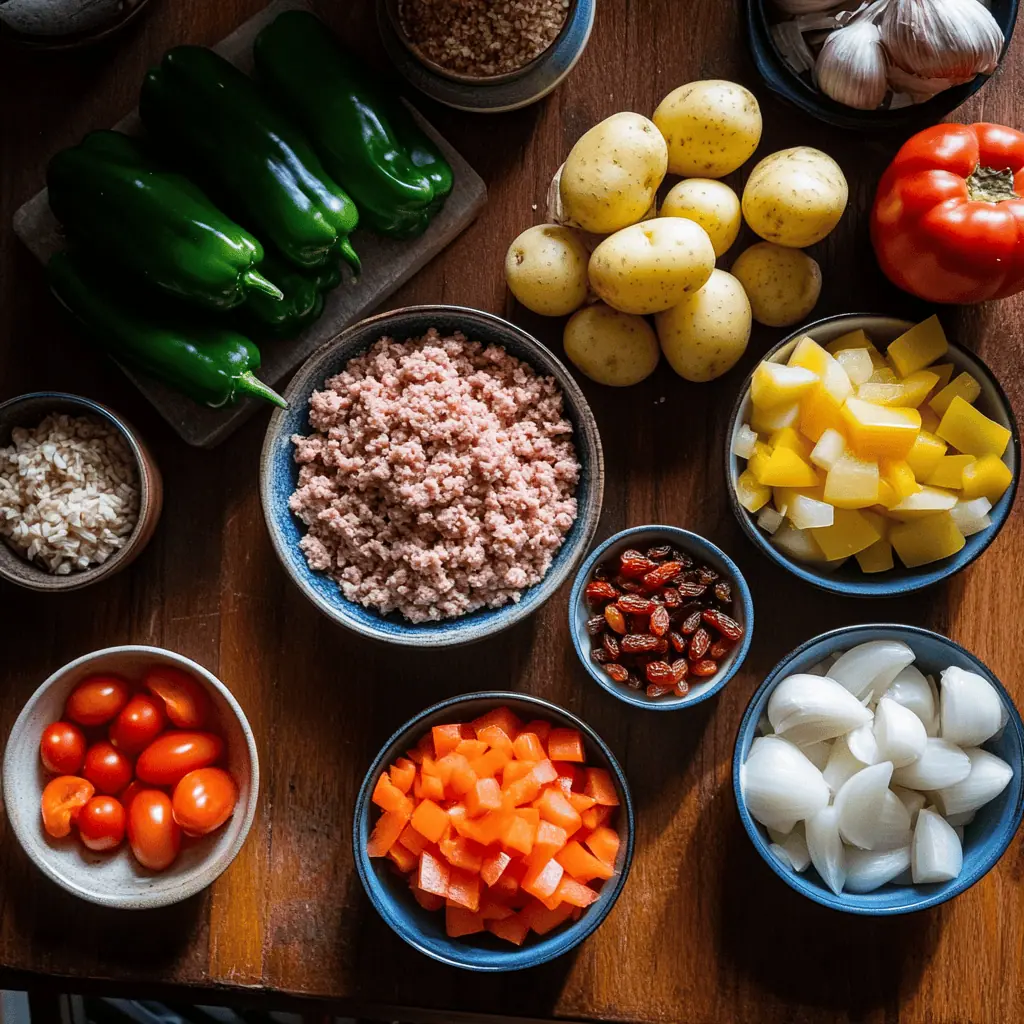
For the Base
- 2 pounds ground pork (giniling na baboy)
- 1 medium onion, finely chopped (sibuyas)
- 4 cloves garlic, minced (bawang)
- 3 large ripe tomatoes, diced (kamatis)
- 2 tablespoons cooking oil (mantika)
For the Vegetables
- 2 medium potatoes, cubed (patatas)
- 2 large carrots, cubed
- 1 red bell pepper, diced
- 1 green bell pepper, diced
- ½ cup raisins (pasas)
For the Sauce
- 2 tablespoons fish sauce (patis)
- 1½ cups water
- 1 tablespoon tomato paste (optional, for richer sauce)
- Salt and pepper to taste (asin at paminta)
Equipment
- Large skillet or kawali (Filipino wok) - Provides even heating and enough space for proper browning of meat
- Sharp chef's knife - For uniform cutting of vegetables
- Wooden spoon or sandok (Filipino cooking spoon) - Perfect for breaking up ground meat
- Cutting board - Preferably with juice grooves for tomatoes
- Measuring cups and spoons - For accurate seasoning and proportions
- Heavy-bottomed pot with lid - Helps retain heat and moisture for tender vegetables
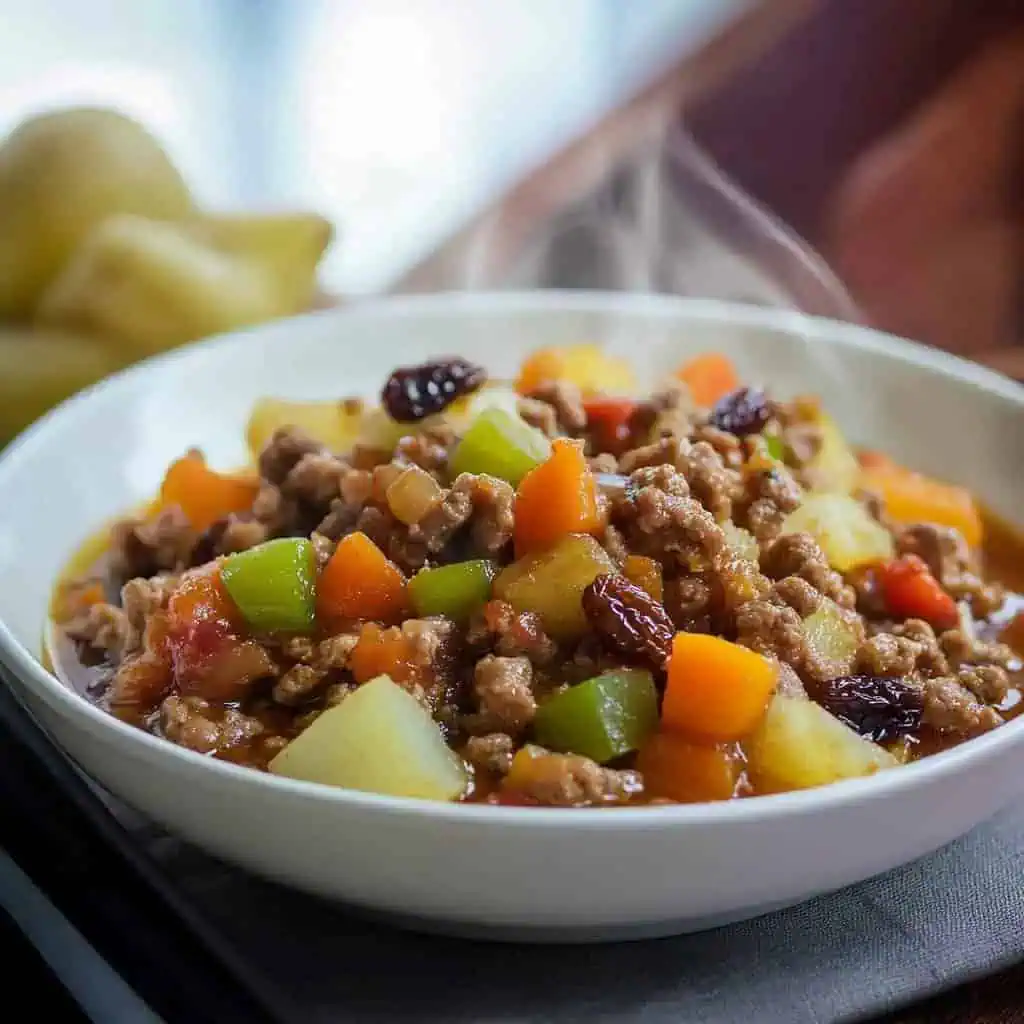
How To Make
- Preparation: Chop all vegetables into uniform sizes - about 1-inch cubes for potatoes, ½-inch for carrots, and similar-sized pieces for bell peppers.
- Sauté Aromatics: Heat oil in your large skillet over medium heat (350°F/175°C). Add onions and garlic, cooking until translucent and fragrant, about 2-3 minutes. Stir occasionally to prevent burning.
- Brown the Meat: Increase heat to medium-high (375°F/190°C). Add ground pork, breaking it into small pieces with your wooden spoon. Cook until light brown, about 8-10 minutes, ensuring even browning for maximum flavor.
- Add Umami: Pour in fish sauce and continue cooking for 2 minutes, stirring well to distribute the flavor throughout the meat.
- Incorporate Tomatoes: Add diced tomatoes and cook until they soften and release their juices, gently pressing them with your spoon to help them break down.
- Create the Sauce Base: Pour in water and bring to a boil. Once boiling, reduce heat to low (300°F/150°C).
- Cook Vegetables: Add potatoes, carrots, and raisins. Cover and simmer for 10-12 minutes, or until vegetables are fork-tender.
- Finish with Bell Peppers: When potatoes and carrots are almost tender, add diced bell peppers. Cook for another 3-4 minutes until peppers are crisp-tender, maintaining their vibrant color.
- Final Seasoning: Taste and adjust with salt and pepper as needed. If the sauce is too thin, simmer uncovered for a few more minutes until it reaches your desired consistency.
- Rest and Serve: Turn off heat and let dish rest for 5 minutes before serving. This allows flavors to meld and sauce to thicken slightly. Serve hot over steaming white rice.

Tips from Lola's Kitchen
- Perfect Browning: Don't rush the meat browning process—this develops deep flavor
- Vegetable Cutting: Keep vegetable cuts uniform for even cooking (pantay-pantay ang pagkakahiwa)
- Bell Pepper Timing: Add bell peppers near the end to maintain their crunch and vibrant color
- Sauce Consistency: The perfect sauce should coat the back of a spoon but not be too thick
- Fish Sauce Control: Add fish sauce gradually and taste as you go—it's easier to add more than to fix overly salty food
Substitutions
- Meat Options: Replace ground pork with ground chicken or turkey for a lighter version
- Vegetable Alternatives: Sweet potatoes (kamote) can replace regular potatoes for added nutrition
- Tomato Base: Use 3 tablespoons tomato sauce if fresh tomatoes aren't available
- Fish Sauce Substitute: 1 tablespoon soy sauce mixed with ¼ teaspoon salt can replace fish sauce in a pinch
- Raisin Alternatives: Chopped dried apricots or a teaspoon of brown sugar can provide similar sweetness
Troubleshooting
- Sauce Too Watery: Simmer uncovered for 5-10 minutes to reduce, or add ½ teaspoon cornstarch mixed with 1 tablespoon water
- Vegetables Unevenly Cooked: Ensure uniform cutting sizes and consider cooking harder vegetables first
- Too Salty: Add a quartered potato to absorb excess salt, then remove before serving, or balance with ½ teaspoon sugar
- Too Bland: Add fish sauce 1 teaspoon at a time rather than plain salt for more depth of flavor
- Meat Too Greasy: Brown meat thoroughly and drain excess fat before adding vegetables
Storage & Reheating
- Refrigeration: Store in an airtight container for up to 3 days. The flavor actually improves overnight!
- Freezing: Portion into freezer-safe containers and freeze for up to 2 months. Thaw overnight in refrigerator before reheating.
- Reheating on Stovetop: Add 2 tablespoons water to prevent drying, heat on medium-low until temperature reaches 165°F (74°C), stirring occasionally.
- Microwave Reheating: Add a splash of water, cover loosely, and heat in 1-minute intervals, stirring between each until thoroughly hot.
- Freshness Tip: For best flavor and food safety, consume within 2 days of refrigeration.

FAQ
Can I make giniling ahead of time?
Absolutely! The flavors actually develop and improve overnight in the refrigerator, making it perfect for meal prep.
How can I make this dish healthier?
Use lean ground pork (at least 90% lean), increase the vegetables, and reduce the oil to 1 tablespoon.
Can I skip the raisins?
Yes, they're optional but add a nice balance of sweetness. You can substitute with a teaspoon of sugar if preferred.
Why is my sauce not as flavorful as I'd like?
Make sure to properly brown the meat and don't skip the fish sauce, which provides essential umami depth.
Can this be made in an Instant Pot or slow cooker?
es! For Instant Pot: use sauté function for steps 1-5, then pressure cook for 5 minutes. For slow cooker: complete steps 1-5 on stovetop, then transfer to slow cooker and cook on low for 4 hours.
Is this dish gluten-free?
Yes, if you ensure your fish sauce doesn't contain gluten (most traditional brands are gluten-free).
What makes authentic giniling different from other ground meat dishes?
The combination of fish sauce, raisins, and bell peppers creates that distinctly Filipino sweet-savory flavor profile.
Related
Looking for other recipes like this? Try these:

Authentic Filipino Giniling na Baboy (Ground Pork Stew)
Ingredients
For the Base
- 2 pounds ground pork giniling na baboy
- 1 medium onion finely chopped (sibuyas)
- 4 cloves garlic minced (bawang)
- 3 large ripe tomatoes diced (kamatis)
- 2 tablespoons cooking oil mantika
For the Vegetables
- 2 medium potatoes cubed (patatas)
- 2 large carrots cubed
- 1 red bell pepper diced (pulang siling pangsigang)
- 1 green bell pepper diced (berdeng siling pangsigang)
- ½ cup raisins pasas
For the Sauce
- 2 tablespoons fish sauce patis
- 1½ cups water
- 1 tablespoon tomato paste optional, for richer sauce
- Salt and pepper to taste asin at paminta
Instructions
- Prepare all your ingredients before starting. Chop all vegetables into uniform sizes - about 1-inch cubes for potatoes, ½-inch for carrots, and similar-sized pieces for bell peppers.
- Set your stove to medium heat (katamtamang init, 350°F/175°C). Pour oil into a large pan or kawali. Wait until the oil is hot but not smoking (Initin ang kawali sa katamtamang init).
- Add your chopped onions and minced garlic to the hot oil. Cook them until the onions become clear and soft, about 2-3 minutes. Stir occasionally to prevent burning (Igisa ang sibuyas at bawang).
- Increase heat to medium-high (375°F/190°C). Add the ground pork to the pan. Break up the meat into small pieces using your sandok or wooden spoon. Cook until the meat turns light brown, about 8-10 minutes.
- Pour in the fish sauce and continue cooking for 2 minutes, stirring to distribute the flavor (Ilagay ang patis at haluing mabuti).
- Add the diced tomatoes to the pan. Cook them until they become soft and release their juices, pressing them gently with your spoon (Ilagay ang kamatis at lutuin hanggang lumambot).
- Pour in the water and bring the mixture to a boil. Once boiling, reduce heat to low (300°F/150°C) (Ilagay ang tubig at pakuluin. Pababain ang init kapag kumukulo na).
- Add the cubed potatoes, carrots, and raisins to the pan. Cover and let simmer for 10-12 minutes, or until the vegetables are tender when pierced with a fork (Ilagay ang patatas, carrot at pasas. Takpan at palambutin).
- When the potatoes and carrots are almost tender, add the diced bell peppers. Cook for another 3-4 minutes until the peppers are crisp-tender (Ilagay ang mga siling pangsigang kapag malambot na ang patatas at carrot).
- Taste your dish and season with salt and pepper as needed. If the sauce is too thin, simmer uncovered for a few more minutes until it thickens to your liking (Timplahan ng asin at paminta. Kung malabnaw ang sarsa, pakuluan ng hindi nakatakip).
- Turn off the heat and let the dish rest for 5 minutes before serving. This allows the flavors to settle and the sauce to thicken slightly.
- Serve hot over steaming white rice (Ihain na mainit kasama ng kanin).
For best results (Para sa pinakamasarap na luto):
- Make sure your ground pork is well-browned before adding other ingredients
- Keep your vegetables uniformly sized for even cooking
- Don't overcook the bell peppers - they should remain slightly crisp
- Let the dish rest before serving to allow flavors to meld
Tips from Lola's Kitchen
- Cut vegetables in uniform sizes for even cooking (pantay-pantay ang pagkakahiwa)
- Don't overcook the bell peppers to maintain their crunch and color
- Let the meat brown properly for better flavor
- If sauce is too thin, simmer uncovered until reduced
- For extra flavor, add 1 tablespoon of tomato paste
Nutrition
The Story Behind Giniling na Baboy (Ground Pork Stew)
The humble Giniling na Baboy holds a special place in Filipino culinary history, representing the ingenuity and resourcefulness that defines Filipino home cooking. Born in the busy kitchens of Filipino households during the post-war era, this ground pork dish emerged as a practical solution for families seeking to create hearty, flavorful meals while working within budget constraints.
The word "giniling" itself, derived from the Tagalog verb "gilingin" (to grind), speaks to the dish's accessible nature. During the 1950s and 1960s, as meat grinders became more common in Filipino markets and households, ground meat dishes gained popularity among the working class. Giniling na Baboy became a testament to the Filipino talent for transforming simple ingredients into something extraordinary.
What makes this dish particularly fascinating is how it reflects the various cultural influences that have shaped Filipino cuisine. The use of tomatoes and potatoes shows Spanish colonial influence, while the addition of fish sauce (patis) speaks to the deep-rooted Asian heritage of Filipino cooking. The optional inclusion of raisins—a distinctly Filipino touch in savory dishes—demonstrates the unique way Filipino cooks adapted Western ingredients to local tastes.
In many Filipino households, Giniling na Baboy serves as a child's introduction to Filipino flavors. Its balanced profile of savory, sweet, and umami tastes helps develop young palates while providing essential nutrients. The dish has earned its place as a beloved "baon" (packed lunch) staple, carried by countless Filipino students and workers in their lunch containers, a practice that continues to this day.
The preparation of Giniling na Baboy also tells a story of Filipino family life. The methodical chopping of vegetables, the patient browning of the meat, and the careful seasoning process often become a lesson passed down from parent to child. Many Filipino cooks can recall standing beside their mother or grandmother, learning how to achieve that perfect balance of flavors that makes their family's version unique.
Regional variations across the Philippines showcase local preferences and available ingredients. In Bicol, known for its spicy cuisine, cooks might add siling labuyo (bird's eye chilies). In Pampanga, the culinary capital of the Philippines, some families add liver spread for extra richness. Coastal regions might incorporate more fish sauce, while inland areas might make it slightly sweeter.
The evolution of Giniling na Baboy from a simple home-cooked meal to a versatile dish served in carinderias (local eateries) and modern Filipino restaurants demonstrates its enduring appeal. Contemporary Filipino chefs have begun exploring new interpretations, creating gourmet versions with premium ingredients while maintaining the dish's comforting essence.
In today's fast-paced world, Giniling na Baboy remains relevant not just for its practicality but for its ability to bring families together. It's often one of the first dishes young Filipinos learn to cook, making it a rite of passage in Filipino kitchens. The dish embodies the "zero-waste" philosophy long before it became trendy, as leftovers can be transformed into torta (omelet), sandwich filling, or even empanada stuffing.
The secret to a memorable Giniling na Baboy isn't found in expensive ingredients or complicated techniques. Instead, it lies in understanding the fundamental principles of Filipino cooking: patience in developing flavors, respect for ingredients, and the importance of cooking with love—or what Filipinos call "lutong pamilya" (family-style cooking).
As Filipino cuisine gains international recognition, dishes like Giniling na Baboy serve as ambassadors of Filipino food culture, showcasing how simple ingredients, when treated with care and knowledge, can create something truly special. It's a dish that tells the story of Filipino resourcefulness, family bonds, and the enduring power of comfort food to connect generations.
Whether served in a humble kitchen or a modern restaurant, Giniling na Baboy continues to evolve while maintaining its status as a beloved Filipino comfort food. It stands as a testament to the Filipino people's ability to create extraordinary flavors from ordinary ingredients, making it not just a dish, but a delicious piece of Filipino cultural heritage.
Remember: The secret to memorable giniling isn't in complicated techniques or rare ingredients—it's in the patient browning of the ground pork, the proper seasoning, and that perfect sauce-to-meat ratio that makes you want to eat more rice.
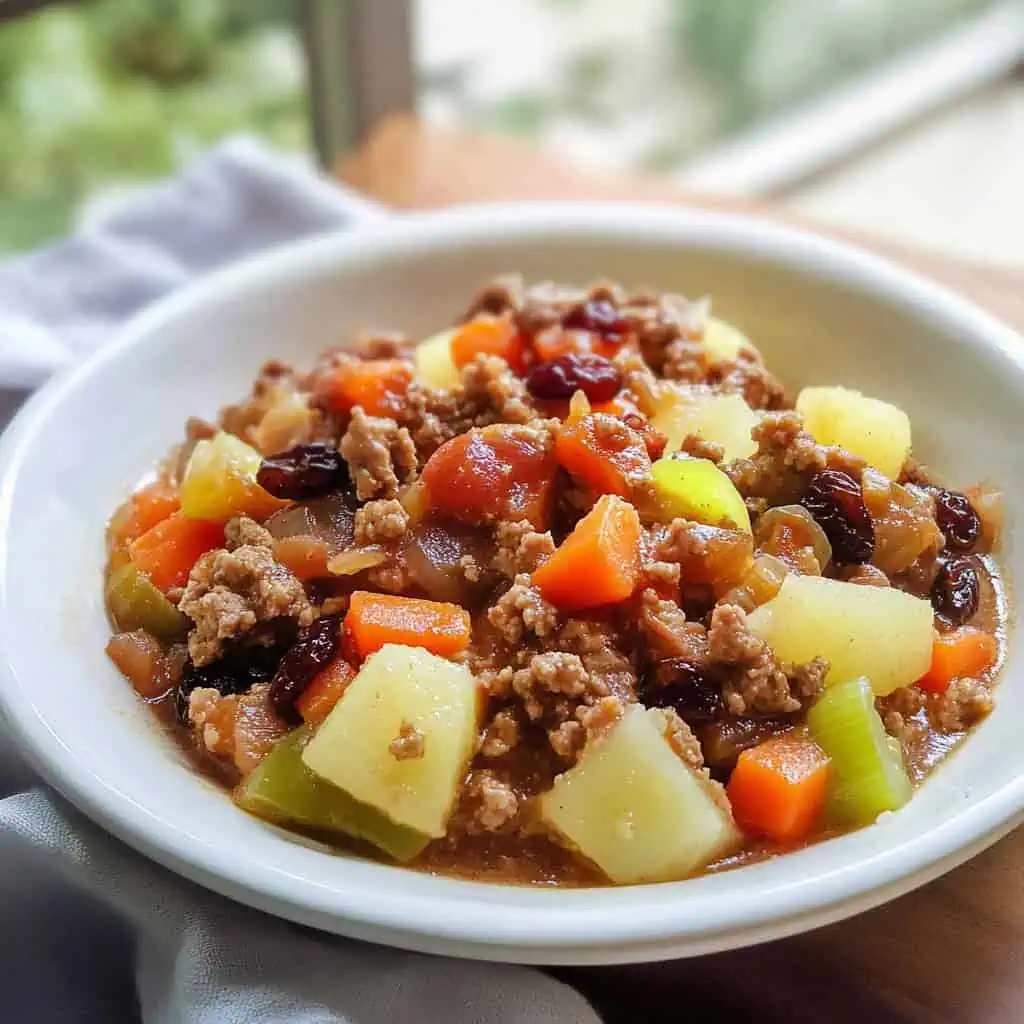


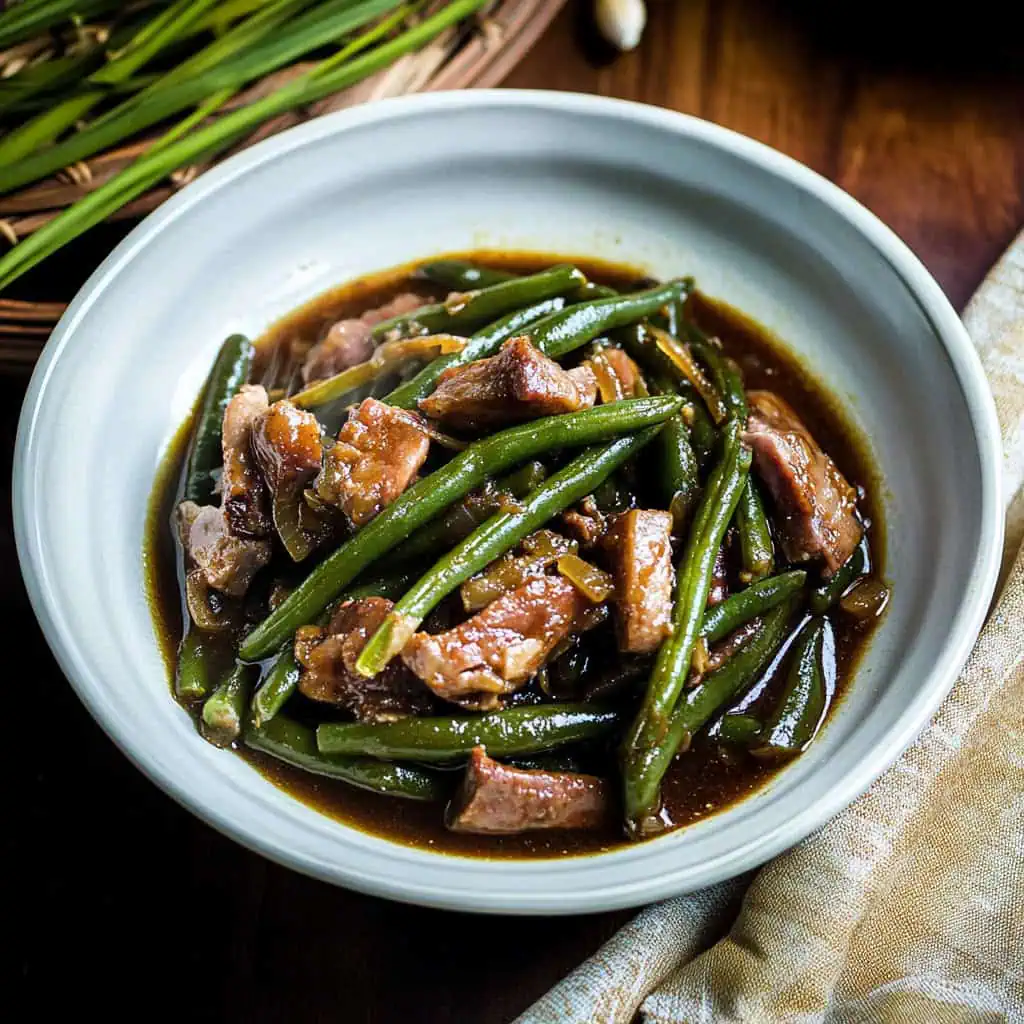

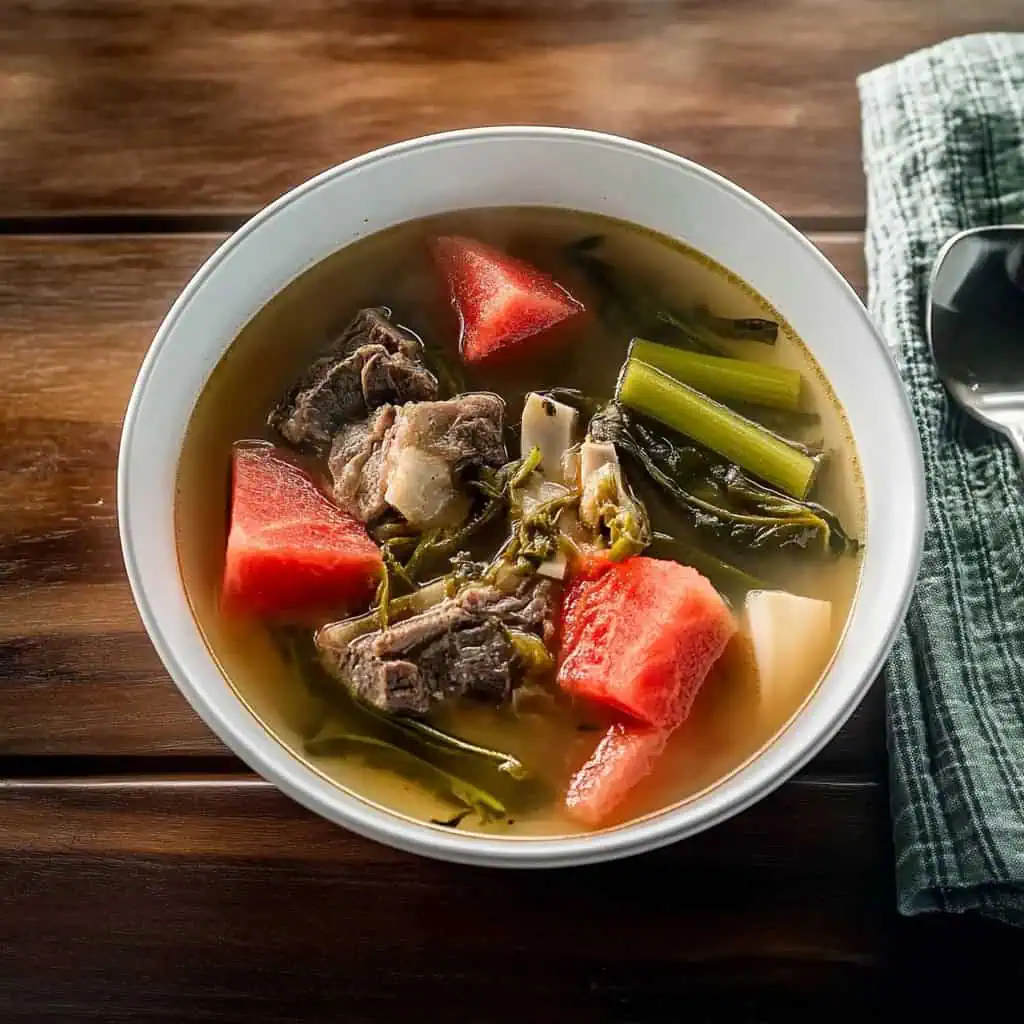




Keithacila says
Easy to cook and delicious